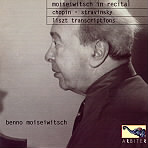Benno Moiseiwitsch’s legendary status will certainly benefit from these live recordings, dated 1954-60, here published for the first time. Despite an accurate restoration, the sound leaves much to be desired; yet Moiseiwitsch’s golden tone shines with a fabulous presence, as if the virtuoso was galvanized by the audience. This is pianism of epic proportions and electrical intensity, as in the impossible Tannhäuser overture transcribed by Liszt. Though messy in places and (very) far from being note perfect–after all, these are unedited live performances– Moiseiwitsch’s readings offer a sense of grandeur and drama equaled only by a handful of pianists. The incredibly imaginative voicings and the visionary phrasings are a constant source of amazement, combining to project new light on works as famous as Chopin’s 2nd Ballade or 2nd Scherzo, both of which are colored by an acute feeling of despair and tragedy. But Moiseiwitsch isn’t just monumental gestures and superhuman virtuosity: his depth and subtlety of touch, which have few rivals, transfigure the simple singing lines of the Chopin/Liszt “My Joys”, as well as the whirlwind figurations of Chopin’s two Op. 28 Preludes and the fluid lines of the Nocturne Op. 37/2. The Bach/Liszt Fantasy and Fugue in G minor suffers the most from poor sound quality, including a few “gaps due to faulty transmission”. Some will object to the old-fashioned style, but what a grandiose performance! Moiseiwitsch was an early advocate of modern music, and his rendering of Stravinsky’s Etude Op. 7/4 is a model of rhythmic independence, liveliness, and clarity. A 15-minute interview of Moiseiwitsch by Abram Chasins, in which the great pianist recounts his memories of Rachmaninov, completes this precious collection of sound documents.
































